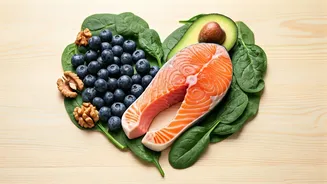Embrace Heart-Healthy Eating
The cornerstone of a healthy heart lies in the food we consume. Experts in cardiology consistently emphasize that adopting a diet rich in specific nutrients
can be instrumental in warding off heart problems and enhancing vascular health. This encompasses the importance of incorporating foods that can combat the build-up of plaque within arteries, a primary contributor to blockages. The focus should be on nutrient-dense options rather than calorie-laden ones. Making conscious choices in what we eat is a proactive approach towards safeguarding our heart's well-being and mitigating potential risks associated with cardiovascular diseases. Furthermore, understanding the impact of various foods on blood vessels is critical, as healthy vessels are crucial for efficient blood circulation and overall cardiovascular health.
Fatty Fish Power
Fatty fish, such as salmon, mackerel, and sardines, are celebrated for their high omega-3 fatty acid content. These essential fats are linked to reduced triglyceride levels, diminished inflammation, and a lower risk of irregular heartbeats. Omega-3s work by helping to keep the arteries clear of plaque build-up. Aim to include at least two servings of fatty fish in your weekly meal plan to gain the benefits. Consider grilling, baking, or steaming these fish to retain their nutritional value, avoiding fried preparations that might add unhealthy fats. By choosing fatty fish, you're not just adding flavor to your meals but also providing your heart with the essential nutrients needed to thrive, directly helping with the prevention of artery blockages.
The Magic of Berries
Berries are packed with antioxidants, which combat oxidative stress and protect cells from damage. The antioxidants in berries, especially anthocyanins, have been found to improve blood vessel function. Incorporating a variety of berries into your diet, like blueberries, strawberries, and raspberries, can significantly benefit heart health. They can be enjoyed fresh, added to smoothies, or sprinkled on oatmeal. Berries are not only delicious but also play a critical role in preventing inflammation. These fruits can help improve blood vessel flexibility, which in turn facilitates better blood flow. Regularly eating berries helps promote a healthy heart and can be easily integrated into any meal plan. Their sweetness can even satisfy cravings for unhealthy snacks.
Nuts and Seeds
Nuts and seeds, such as almonds, walnuts, flaxseeds, and chia seeds, provide healthy fats, fiber, and antioxidants. These components work together to lower LDL (bad) cholesterol levels and improve overall heart health. Fiber aids in reducing cholesterol absorption in the digestive system. Choose unsalted varieties to avoid added sodium. Nuts and seeds can be easily added to your diet. Consider them as a snack, added to salads, or sprinkled on yogurt. These plant-based foods can act as a shield against heart disease, protecting against artery blockage and fostering a resilient cardiovascular system. They are also easily portable and can be consumed on the go, making them a convenient choice.
Leafy Greens' Role
Leafy green vegetables are rich in vitamins, minerals, and antioxidants, all vital for heart health. They are particularly high in vitamin K, which helps in blood clotting and may contribute to preventing arterial calcification. Consuming a diverse range of leafy greens, such as spinach, kale, and collard greens, can support the vascular system. Incorporate them into salads, smoothies, or sauté them as a side dish. The antioxidants in leafy greens can help protect the heart from damage caused by free radicals. Including them in meals is a step toward fortifying cardiovascular health. They are low in calories and high in nutrients, making them an excellent choice for a balanced diet that prioritizes heart health and helps prevent heart blockages.













